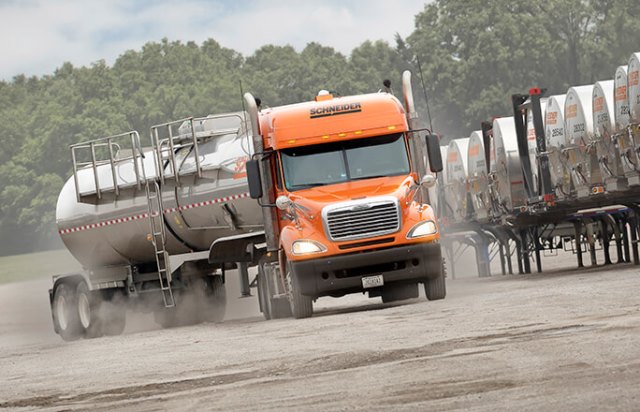Twenty fleets operating more than 71,844 tractors and 236,292 trailers saved over $600 million in 2017 compared to the average trucks on the road.
They achieved this by adopting a variety of fuel-efficiency technologies, according to the 2018 Annual Fleet Fuel Study released by the North American Council for Freight Efficiency (NACFE).
Combined, these fleets reached an average fuel economy of 7.28 mpg compared to the average U.S. fleet number of 5.91 mpg, marking a 2 percent increase over 2017 and representing a return to the 2 percent eight-year average gain.
The report contains the results of a deep-dive investigation into the adoption of various products and practices for improving freight efficiency among 20 major North American fleets. This is the sixth annual update of the 2012 inaugural study, which has been described as an important read for anyone working on improving fuel efficiency.
Fleets providing data for this 2018 study were Bison Transport; Cardinal Logistics; CFI; CR England, Challenger Motor Freight, Crete, Frito-Lay, Hirschbach, Maverick, Mesilla Valley Transportation; NFI Industries; Nussbaum; Paper Transport; Prime; Ryder System Inc.; Schneider; United Parcel Service; and U.S. Xpress.
“I look forward to this report and read it each year within days of it being published. It is important to Schneider’s efforts and it can be a critical resource to any fleet or owner-operators as well as manufacturers and others who are working to improve Class 8 efficiency,” said Rob Reich, senior vice president, equipment, maintenance and driver development at Schneider.
“Each year the report has been published, it has been NACFE’s most downloaded report,” said Mike Roeth, NACFE executive director. “The findings of this report should prove invaluable to efforts to improve fuel economy.”
The overall adoption rate for the 85 technologies studied in the report has grown from 17 percent in 2003 to 44 percent in 2017.
Not all technologies could be applied to a single tractor-trailer, as some are clearly an either-or decision.
For 2018 study, the technologies were kept consistent with the 2017 study.
In 2016, many new technologies were added to the survey as technology developers brought new choices to the fleets for purchase.
These included:
- Idle Reduction — Light color exterior paint, use of hotels, tractor solar and trailer solar panels
- Chassis — Tractor lift axles, trailer lift axles, high-efficiency alternators
- Powertrain — Mechanical turbo compounding, FA-4 low viscosity lubrication
- Tractor Aerodynamics — Drive tandem fairings, tractor gap reducers, vortex generators, and platooning capability, and
- Practices — Vehicle mpg data analysis, maintenance for fuel economy, real-time driver coaching.
The largest gainers in adoption by these fleets, when comparing their purchases in 2017 to those in 2016, occurred with the following technologies:
- Cab extenders: 90 percent adoption in 2017, 21 percent gain year-over-year
- Lower viscosity engine oil: W-30, 87 percent in 2017, 29 percent year-over-year
- Shift to neutral: 57 percent in 2017, 28 percent year-over-year
- Direct drive transmission: 53 percent in 2017, 20 percent year-over-year, and
- In-cab cameras, 49 percent in 2017; 28 percent year-over-year.
For the first time since the study’s inception, the NACFE team sought data from other organizations involved in Class 8 tractor-trailer efficiency. Data was received from ATBS, NPTC and FleetAdvantage, and compared to the NACFE results. All four studies show a solid increase in fuel efficiency over the past eight years.
The North American Council for Freight Efficiency (NACFE) is a nonprofit organization dedicated to doubling the freight efficiency of North American goods movement. NACFE operates as a nonprofit in order to provide an independent, unbiased research organization for the transformation of the transportation industry.
Data is critical and NACFE helping the industry with real-world information that fleets can use to take action. Learn more at www.nacfe.org.
The Trucker News Staff produces engaging content for not only TheTrucker.com, but also The Trucker Newspaper, which has been serving the trucking industry for more than 30 years. With a focus on drivers, the Trucker News Staff aims to provide relevant, objective content pertaining to the trucking segment of the transportation industry. The Trucker News Staff is based in Little Rock, Arkansas.















